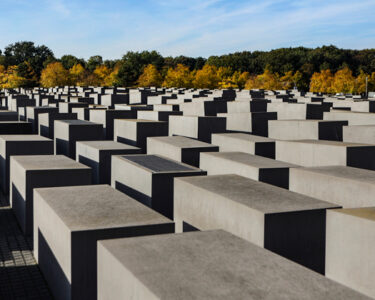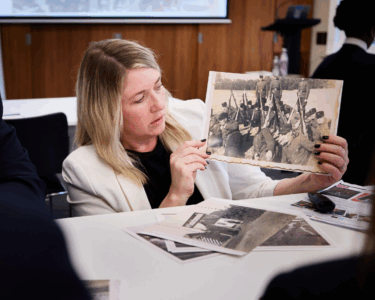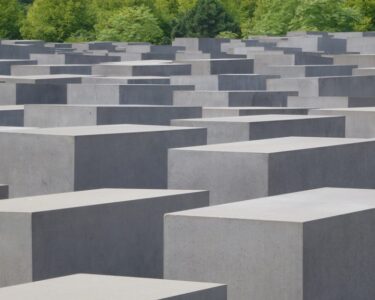We concluded our Holocaust Memorial Day blog about teaching ‘difficult’ histories with the proposition: ‘We could assess these kinds of knowledge, but is it appropriate to do so?’ Since then, we have been exploring this idea further.
Our current focus on assessing how students understand and learn about ‘difficult histories’ arose from research (2019-20), led by the UCL Centre for Holocaust Education,to explore teaching about the Holocaust in English secondary schools, which surveyed more than 1,000 teachers. The original study was not about assessment, but we found that teachers were keen to explore ways to reflect on their teaching and their students’ experiences of learning about the Holocaust. However, some noted that care is necessary when considering how assessment could happen, as this interviewee stated:
…we need to give them the emotional space to actually realise what the topic’s about, and the impact it has on people, and I think if we start bolting on assessments to it we lose some of that ability for them to actually self-reflect.
Assessment research with teachers has long revealed a tension between what is taught, how learning is evidenced, and students being motivated by grades – because such behaviour can make students reluctant to engage with learning without obvious recognised benefits such as a qualification. This is not to say that education for qualifications is a bad thing, but that we have to acknowledge the influence high-stakes test outcomes have on students’ engagement with their lessons and the things they value in their learning.
Some teachers in this study wanted to create opportunities for students to develop and articulate broader understandings relating to civic and moral issues with the aim of creating assessments to explore students’ verbal and written reflections in meaningful ways.
The study revealed that teachers had created a range of assessment activities: for example, designing a Holocaust memorial, creating a museum exhibition, producing reflective summaries of lessons and participating in class discussions. It’s important to note that some respondents, often history teachers, said that these assessment activities were not typical of their usual practice, but they felt that assessment of Holocaust education needed to be different.
The 2019/20 survey also found that when teaching about the Holocaust, more than two thirds (66.4%) of history teachers prioritised learning-based aims relating to social, moral or civic agendas, such as developing students’ understanding of prejudice, racism and stereotyping. Meanwhile, just under a third (31.3%) focused on history-based aims, such as knowledge of the Second World War and Twentieth Century history. These different priorities might have contributed to comments that acknowledged the need to approach assessment differently to fit with their adapted models for teaching.
Viewing this in terms of assessment practice, it would appear important to teachers to prioritise valuable soft skills such as understanding, motivation and decision-making. However, as noted by some respondents, capturing evidence of these broader, interpersonal, socially orientated dimensions is complicated. As one trainee history teacher asked:
How do you assess that people have got more tolerant?
This question reveals the challenge of diversifying assessment for learning outcomes that are not ‘standard’. However, thinking differently is not only critical to teaching and learning about the Holocaust but is also necessary for assessment. Research by Foster et al (2016) with more than 8,000 students uncovered alarming misconceptions about the Holocaust, even when it had been studied as part of their history curriculum. For example, 74% of students surveyed grossly over-estimated (15-30 times) the Jewish population in pre-war Germany; and just 9% were able to provide an accurate number. Given that Holocaust education is used to develop and improve students’ attitudes, such aims might be compromised if their knowledge is fundamentally flawed.
Knowledge gaps and misconceptions that endure after students have spent time learning a topic should always prompt teachers to evaluate their practice. In relation to the Holocaust, misconceptions raise concern because many teachers want students to learn from the Holocaust as well as about it. If students don’t gain sound historical knowledge and understanding, then key opportunities to develop more profound, broader understanding will be missed. We can only pinpoint such gaps by assessment of what is learned (and what is missing). Therefore we must assess the learning.
Teaching and learning about the Holocaust should include broad approaches to assessment such as reflection on difficult ‘big’ questions: how was it possible for the Holocaust to occur? Such reflections provide opportunities to assess whole class understanding and extend the learning with deeper explorations of the issues, e.g., documenting and interrogating the actions of those complicit in this genocide. Group activities can be followed with a whole class plenary considering what learning about the Holocaust means now. Whilst it might seem that such a structure is straightforward to use in a classroom, it continues to raise further assessment-related questions, for example:
- Do we need learning outcomes for students to aspire to?
We do, and they should relate to a sound understanding of evidence relating to key events so that misconceptions can be acknowledged and addressed. High-stakes assessment via an examination, or other standardised test can play a part in a broader assessment of learning about the Holocaust. There may be some concern that attempting to measure such knowledge will result in narrowing of the curriculum, but awareness of this tension serves to ensure assessment designers focus on ways to capture evidence of critical thinking and engagement with difficult subjects of all kinds.
- Are we looking for students to achieve something in particular?
We are, and it is something beyond the sound knowledge of the historical content. We are seeking to challenge how students think about their learning, not simply in terms of facts, but rather in terms of being critically engaged: negotiating difference, listening to and discussing ideas, seeking to develop skills of enquiry and tackling big issues.
These propositions might appear vague on first reading, but they adequately represent the realistic and imprecise nature of educational assessment. Developing an appreciation of how assessment, in its many forms, can promote teaching and enhance learning is recognised as important to teachers engaged in teaching the difficult histories of all kinds and those focused on teaching about the Holocaust are no different. Our further interrogation of the data using an assessment-orientated lens is not just about seeking ways for teachers to interpret what students know and understand, but also how pedagogical strategies can be adapted to facilitate opportunities to achieve the aims that underpin teaching about the Holocaust.



